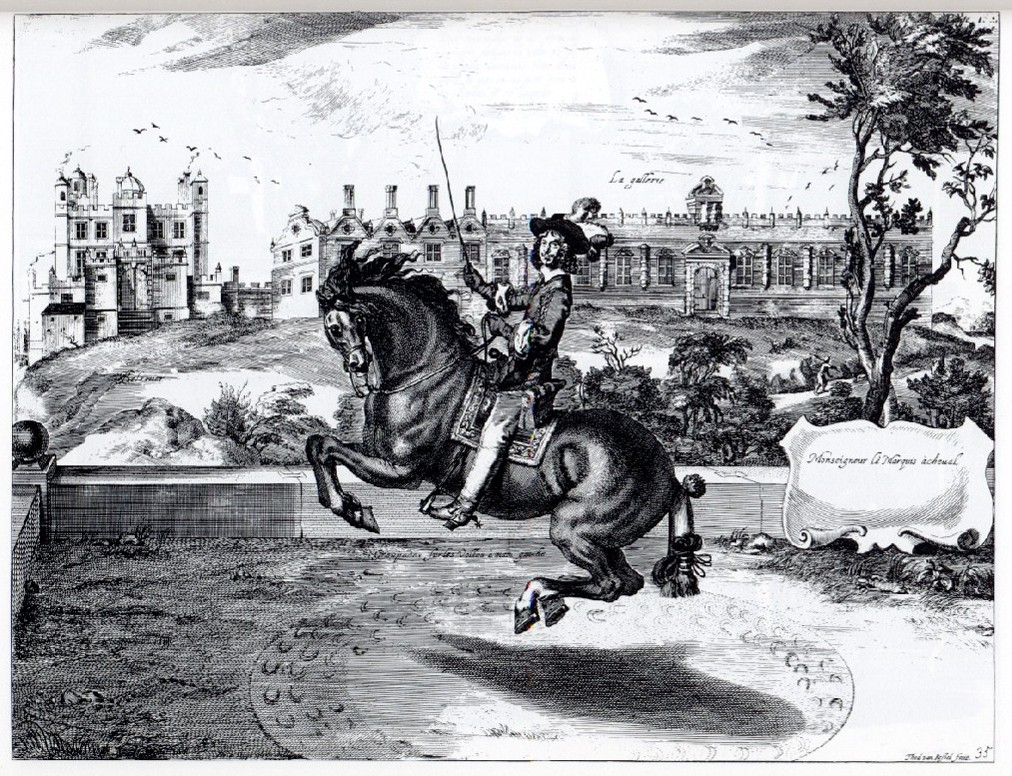 Das Buch von de la Broué finden Sie auf der Seite
Originaltexte
,
Newcastles " A General System of Horsmanship" nur in der 1743 ins Englische übersetzten französischen Urausgabe von 1658. Offensichtlich haben Autoren, die sich derart negativ über ihn geäußert haben, das Buch nicht gelesen. Tut man dies, so begegnet man einer fazinierenden, gebildeten Persönlichkeit mit überzeugendem Fachwissen, das lebendig und mit Humor vorgetragen wird. Er geht in der Pferdeausbildung keineswegs brutal, sondern konsequent nach der heute als operantes Konditionieren geläufigen Methode vor.
Das Buch von de la Broué finden Sie auf der Seite
Originaltexte
,
Newcastles " A General System of Horsmanship" nur in der 1743 ins Englische übersetzten französischen Urausgabe von 1658. Offensichtlich haben Autoren, die sich derart negativ über ihn geäußert haben, das Buch nicht gelesen. Tut man dies, so begegnet man einer fazinierenden, gebildeten Persönlichkeit mit überzeugendem Fachwissen, das lebendig und mit Humor vorgetragen wird. Er geht in der Pferdeausbildung keineswegs brutal, sondern konsequent nach der heute als operantes Konditionieren geläufigen Methode vor.William Cavendish, Earl, Marquis and Duke of Newcastle war eine bedeutende Persöhnlichkeit im England zur Zeit von Charles I. Er war ein gebildeter Mann, der sich für Philosophie, Kunst und Musik interessierte, war Freund und Förderer bedeutender Persöhnlichkeiten wie Descartes, Hobbs,Jonson und Dryden und veröffentlichte selbst Gedichte und Dramen. In den Unruhen der Revolution kommandierte er die Nordarmee, musste aber 1644 nach Cromwells Sieg England verlassen. Er ließ sich in Antwerpen nieder und mietete ein Haus von Rubens Witwe. Von nun an widmete er sich der Reitkunst, begann mit der Niederschrift seiner Methoden und beauftragte den Maler Abraham van Diepenbeke mit den Illustrationen. 1665 nach dem Sieg von Charles II, dessen Erzieher und persöhnlicher Ratgeber er war, kehrte er nach England zurück und wurde wieder Duke of Newcastle, widmete sich aber weiter der Pferdeausbildung bis zu seinem Tod 1676.
Seine Texte sind etwas ungeordnet und enthalten viele Wiederholungen, sie treffen aber immer ins Schwarze. Dabei zieht er häufig originelle und witzige Vergleiche zur Verdeutlichung seiner Thesen heran. Man erkennt den genialen Praktiker und Könner.
Originaltext
Patience is one means of dressing a horse. It is true, that patience without knowledge will never do as knowledge will seldom do witout patience. You must therefor treat him gently and not exert your full power.
Geduld ist eines der Geheimnisse bei der Pferdeausbildung. Es ist war, dass Geduld ohne Wissen niemals erfolgreich sein wird, ebenso wie Wissen ohne Geduld selten zum Erfolg führt.
Ganz entschieden wendet er sich gegen jede Art von gezwungenener Steifheit, die aus unelastischem Einnehmen von gezierten Posen resultiert. Leider gelingt es Diepenbeke nicht, dies in seinen Bildern deutlich zu machen.
 I don't mean, that he should fix himself like a post, or that he should fit upon a horse like a statue; but, on the contrary, that he should be in a free and easy position, as it is expressed in dancing with a free air. Therefor I would have a Gentleman appear on horseback without stiffness and formality, wich rather favours of the scholar than the master; and I could never observe such formality, without conceiting the rider to look aukward and filly.
I don't mean, that he should fix himself like a post, or that he should fit upon a horse like a statue; but, on the contrary, that he should be in a free and easy position, as it is expressed in dancing with a free air. Therefor I would have a Gentleman appear on horseback without stiffness and formality, wich rather favours of the scholar than the master; and I could never observe such formality, without conceiting the rider to look aukward and filly.